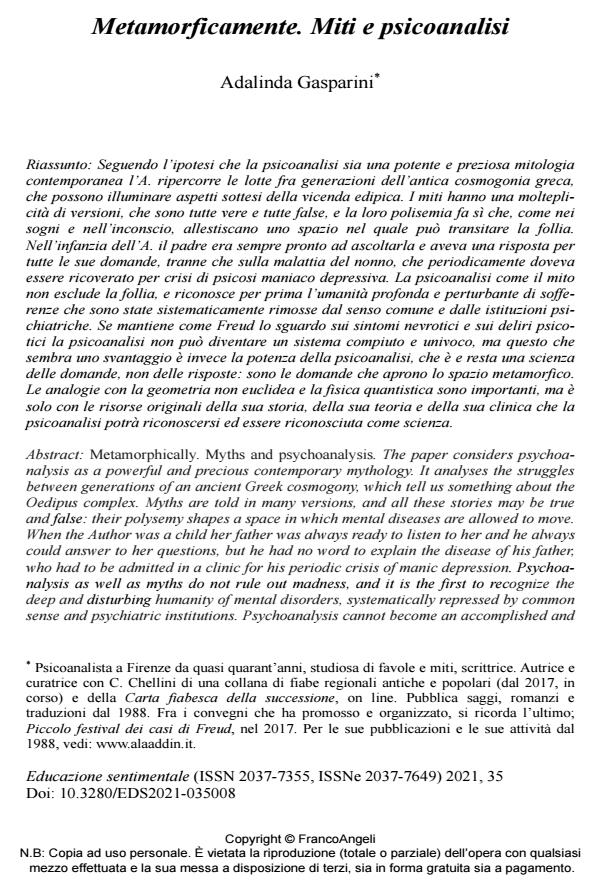Metamorphically. Myths and psychoanalysis
Journal title EDUCAZIONE SENTIMENTALE
Author/s Adalinda Gasparini
Publishing Year 2021 Issue 2021/35
Language Italian Pages 18 P. 92-109 File size 350 KB
DOI 10.3280/EDS2021-035008
DOI is like a bar code for intellectual property: to have more infomation
click here
Below, you can see the article first page
If you want to buy this article in PDF format, you can do it, following the instructions to buy download credits

FrancoAngeli is member of Publishers International Linking Association, Inc (PILA), a not-for-profit association which run the CrossRef service enabling links to and from online scholarly content.
Myths and psychoanalysis. The paper considers psychoanalysis as a powerful and precious contemporary mythology. It analyses the struggles between genera-tions of an ancient Greek cosmogony, which tell us something about the Oedipus complex. Myths are told in many versions, and all these stories may be true and false: their polysemy shapes a space in which mental diseases are allowed to move. When the Author was a child her father was always ready to listen to her and he always could answer to her questions, but he had no word to explain the disease of his father, who had to be admitted in a clinic for his periodic crisis of manic depression. Psychoanalysis as well as myths do not rule out madness, and it is the first to recognize the deep and disturbing humanity of mental disorders, sys-tematically repressed by common sense and psychiatric institutions. Psychoanaly-sis cannot become an accomplished and unambiguous method or theory if it keeps its look on neurotic symptoms and on psychic delusion. This may seem like a dis-advantage, but it is the power of psychoanalysis instead, because it is a science of questions, not of answers; the questions open the metamorphic space. There are many important analogies to deepen between psychoanalysis and sciences like non-Euclidean geometry and quantum mechanics, nevertheless psychoanalysis will be recognized as a science by others - and by itself - only by its own history, its theory and its treatments.
Keywords: Freud, psychoanalysis, metamorphosis, science, myth, storytelling, madness, neurosis, dream, treatment, theory.
- Basile G.B. (2013). Lo cunto de li cunti overo lo trattenemiento de’ peccerille. C. Stromboli, a cura di, 2 tomi. Roma: Salerno Editrice. Tomo II. Vedi anche, online -- http://www.alaaddin.it/_TESORO_FIABE/FD_Campania_Li_sette_palommielle.html; ultimo accesso 25/04/2021.
- Colli G. (1996). La sapienza greca. Eraclito. In: G. Colli, 3 voll., vol. III. Milano: Adelphi.
- Esiodo. Teogonia. -- http://www.alaaddin.it/greche/index.html. Trad. nostra; ultimo accesso, 02/04/2021.
- Freud S. (1907). Gradiva. Un racconto di Wilhelm Jensen e uno studio analitico di Sigmund Freud con un commento di C.L. Musatti. Torino: Boringhieri, 1961.
- Freud S. (1913). Il motivo della scelta degli scrigni. In: OSF VII. Torino: Bollati Boringhieri. 1975; pp. 203-218.
- Freud S. (1917). Una difficoltà della psicoanalisi. In: OSF VIII. Torino: Bollati Boringhieri, 1976; pp. 653-664.
- Freud S. (1920). Al di là del principio di piacere. In: OSF IX. Torino: Bollati Boringhieri, 1977; pp. 185-249.
- Freud S. (1937). Costruzioni in analisi. Trad. it di A. Sciacchitano, -- http://www.sciacchitano.it/Psicanalisti/Freud/costruzioni%20critiche.pdf; ultimo accesso 29/04/21.
- Freud S. (1938). Sommario di psicoanalisi. S. David e E. Servadio, a cura di. Prefazione di Emilio Servadio. Firenze: Editrice Universitaria, 1957.
- Omero. Odissea. Versione di Rosa Calzecchi Onesti. Torino: Einaudi, 1963.
- Platone, Simposio, a cura di Giorgio Colli. Milano: Adelphi 1996 (prima ed. 1979)
- Thom R. (1991). Predire n’est pas expliquer. René Thom à la question par Emile Noel. Paris: Edition Eshel.
Adalinda Gasparini, Metamorficamente. Miti e psicoanalisi in "EDUCAZIONE SENTIMENTALE" 35/2021, pp 92-109, DOI: 10.3280/EDS2021-035008